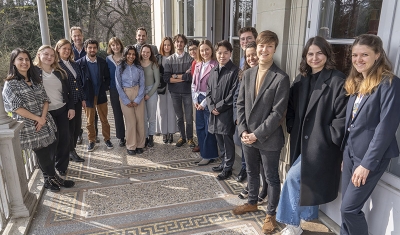Local and Regional Governments as Key Actors in Advancing Human Rights and the SDGs
Event


jcomp/Freepik
Co-organizers
Introduction and objectives
Local and Regional Governments (LRGs) play a vital role in turning international human rights commitments and the Sustainable Development Goals (SDGs) into concrete local actions. As the level of government closest to communities, they are uniquely positioned to address inequalities, strengthen access to essential public services, and promote inclusive and participatory decision-making. Yet, despite their growing responsibilities, LRGs remain underrepresented in UN human rights mechanisms, with reporting, monitoring, and implementation processes largely centered on national governments.
This side event will explore how LRGs can be further recognized and empowered as key human rights actors, building on recent Human Rights Council (HRC) resolutions, particularly HRC Resolution 57/12 on Local Government and Human Rights and HRC Resolution 51/33 on National Mechanisms for Implementation, Reporting, and Follow-up (NMIRFs). It will also reflect on insights from the Bologna Expert Roundtable on Data Planning and Collection by NMIRFs: the Role of LRGs, which underscored the need for greater policy coherence between local, national, and international human rights frameworks.
A key focus will be the potential of Voluntary Local Reviews (VLRs) as a tool for bridging governance gaps and ensuring accountability. VLRs provide a structured way for LRGs to integrate local perspectives into global human rights monitoring and SDG implementation, reinforcing their role as essential contributors to national and international reporting efforts. In this context, LRGs can provide disaggregated data that captures local realities often overlooked in national assessments, improving both policy implementation and oversight. Their engagement with the Universal Periodic Review (UPR)—a state-led process where central governments report on their human rights commitments—could further strengthen the accuracy of national reporting and enhance follow-up on UPR recommendations in key areas such as housing, education, and social inclusion.
All these key reflections—on LRGs' role in human rights governance, their contributions to SDG and human rights reporting, their integration into UN mechanisms, and the potential of VLRs—are examined in depth in the new Geneva Academy Briefing No. 25, Localizing Multilateralism: The Role of Local and Regional Governments in Advancing Human Rights and Sustainable Development Goals. This side event will serve as the occasion to officially launch the publication, offering a space to discuss its findings and explore their implications for policy and practice. Copies of the Academy Briefing will be provided for participants attending the side event.
By bringing together policymakers, UN officials, academics, and LRG representatives, this event will identify strategies to strengthen LRGs’ collaboration with NMIRFs and international human rights mechanisms. The discussion will also highlight best practices, data collection innovations, and institutional partnerships that can enhance LRGs’ contributions to human rights and sustainable development governance.
Opening Remarks
- H.E. Vincenzo Grassi, Ambassador, Permanent Representative, Permanent Mission of Italy to the UN in Geneva
- H.E. Mario Raúl Cano Ricciardi, Ambassador, Permanent Representative, Permanent Mission of Paraguay to the UN in Geneva
- Min. Plen. Giovanni Battista Iannuzzi, President, Inter-ministerial Committee for Human Rights of Italy (video statement)
Panel Discussion
- Moira Rotondo, Head of European Policies Department, Coordination of the Committee of the Regions (CoR), Relations with EU and non-EU Associations, International Cooperation, National Association of Italian Municipalities (ANCI)
- Marie-Eve Boyer, Human Rights Officer, Human Rights Council and Treaty Mechanism Division, Office of the UN High Commissioner for Human Rights (OHCHR)
- Kamelia Kemileva, Co-Director, Global Cities Hub
- Domenico Zipoli, Project Coordinator, Geneva Human Rights Platform
Moderator
- Ludovica Chiussi, Associate Professor, Department of Legal Studies, University of Bologna
Q&A session with audience participation
Sandwiches will be provided prior to the event
Disclaimer
This event may be filmed, recorded and/or photographed on behalf of the Geneva Academy. The Geneva Academy may use these recordings and photographs for internal and external communications for information, teaching and research purposes, and/or promotion and illustration through its various media channels (website, social media, newsletters, annual report, etc.).
By participating in this event, you are agreeing to the possibility of appearing in the aforementioned films, recordings and photographs, and their subsequent use by the Geneva Academy.








